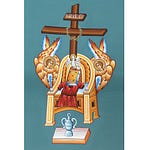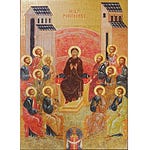Our patron, Saint Paul, has a word today about true holiness. And we also hear the curious story Jesus and the Canaanite woman, about which we will speak about in a moment. Paul teaches that God called us to a lift of holiness. That holiness is characteristic of our prayer life, indeed how we walk, so as to please God. Indeed, as David says in our Psalm: that we lift up our soul to God, in Whom we put our trust. Our lives ought be different than regular lives of non-Christians. So we will get into that more.
I completed my sermon last Sunday with these words: Let us say unto the Lord: Lord, Thou art my hope, and my stronghold. And how do we say this but in prayer? Prayer is the lifting up of the heart and mind to God, taught S. John of Damascus, 8th century Church Father. Let us truly pray, by lifting our heart and mind to God this whole season of Lent. This is what makes Lent a holy season: that our prayer is more intense, that our prayer is more robust, that our prayer is regular, which is to say, daily. End of those words.
So Lent is the season especially to focus on holy lives, and the holiness which must be part of every Christian’s experience, because as Saint Paul teaches in his epistle to the Hebrews, “Strive for peace with all men, and for the holiness without which no one will see the Lord.”
This is one of the lessons our Lord seeks to teach us through the Gospel account from Saint Matthew. The thing to immediately notice in passage is the tension evident between the disciples and Our Lord Jesus. “Send her away, for she is crying after us,” they implore Jesus. But Jesus does not send her away, but rather listens to her, talks with her, and eventually praises her great faith, so much so that we are left with the impression that it was her great faith that healed her daughter from the demon, indeed exorcised her of the demon.
The next thing to notice is the dialogue between Jesus and the Canaanite woman. After the disciples attempted unsuccessfully to command Jesus to send her away, He says “I was sent only to the lost sheep of the house of Israel.” But she came and knelt before Him – she knelt, that is, she worshiped – and she said, “Lord, help me. And He answered, “It is not fair to take the children’s bread and throw it to the dogs.” And she said, “Yes, Lord, yet even the dogs eat the crumbs that fall from their master’s table.” Then Jesus answers, great is your faith! Be it done for you as you desire.” It sounds on a plain reading that Jesus is being unloving at first and is trying to exclude the woman. But if that we the case, it would violate basic doctrine about Jesus, that His very nature is love and that His Mission from the beginning is always for the salvation of all peoples. So what is going on here?
It is not Our Lord who is being taught about compassion and love, but rather the disciples and their hardened hearts, and by extension, us and our hardened hearts. Both of the seemingly inflammatory statements by Jesus—the first, “I was sent only to the lost sheep of the house of Israel,” and the second, “It is not fair to take the children’s bread and throw it to the dogs”—reflect the exclusionary attitude of the Jewish religion of Jesus’s day, as well as the centuries prior. The Jews had been looking for a political messiah to restore political power to them and allow them to complete the rebuilding of the Temple and thereby overthrow their occupiers, the Romans. The last thing they wanted was a Messiah for all peoples Whose very showing of divine power was to die on the tree of the Cross—and be a voluntary failure according not to the illumined eyes of the heart, but rather according to the closed and blind eyes of the world. But it was always the plan of Jesus to show the world what it means to be God by the way He died as a human being.
In other words, Jesus used this moment with the Canaanite woman to teach not her but the disciples words He had taught to Isaiah centuries before: “Foreigners who join themselves to the Lord, to minister to Him, to love the Name of the Lord, and to be His servants, every one who keeps the Sabbath, and does not profane it, and hold fast My covenant—these I will bring to My holy mountain, and make them joyful in My house of prayer.”
And this is what holiness means: God is at work in all people, with no exceptions. He was at work in the prostitute Rahab in our first reading, so much so that through her faith, Joshua led the sons of Israel through the Jordan into the promised land. He was at work in the Canaanite woman, so much so that through her faith not only was her daughter healed, but it was used by Jesus to teach all Christians about real faith. Recognizing that God is at work in all people mean our heart and mind are holy, that they are partaking of the living water springing up into life eternal, indeed participating in the celestial water which is above the heavens. Such a heart and mind have been applied to lofty and exalted things, and able, as Saint Paul teaches, to regard no one from a human point of view, even to put on the mind of Christ, which we all are called to do – to love as Christ loves. Through the grace of Jesus Christ, Who lives and reigns with the Father in the unity of the Holy Ghost, ever one God, world without end. Amen.











Share this post